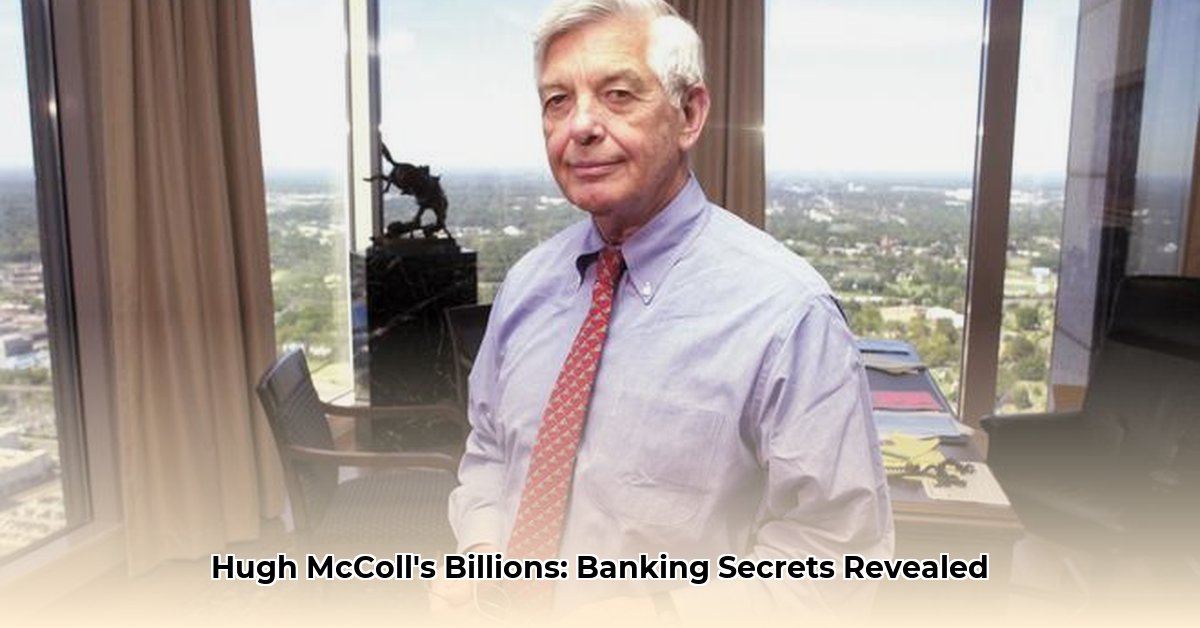
Hugh McColl Net Worth Forbes: A Banking Empire Built on Calculated Risks
First Citizens Bank's recent acquisition of Silicon Valley Bank (SVB) has ignited intense scrutiny of its rapid expansion strategy. To understand First Citizens' trajectory, we must examine the legacy of banking titans like Hugh McColl Jr., whose aggressive acquisition strategy at NCNB/NationsBank built a financial empire. This article explores First Citizens' approach, highlighting both its successes and potential risks, and assesses whether the Holding family can replicate McColl's remarkable success. The key question: can this strategy sustainably build a banking dynasty comparable to McColl's?
Did First Citizens' acquisition of SVB represent a stroke of genius, or a risky gamble? The bank's strategy of acquiring struggling banks at discounted prices has yielded significant short-term gains, as evidenced by the dramatic increase in size and market influence following the SVB deal. However, this rapid expansion harbors inherent risks. Integrating large, complex banks is a Herculean task, fraught with potential pitfalls including problematic loan portfolios and the complexities of melding diverse organizational cultures.
A Winning Bet on Troubled Banks? The SVB Acquisition and Beyond
First Citizens' acquisition strategy centers on identifying and acquiring financially distressed banks. This presents both opportunities and challenges. While the SVB acquisition significantly expanded First Citizens' asset base and market share, it also introduced a massive loan portfolio with potential risks. Could the integration of such a large and complex institution create unforeseen challenges? What are the implications of the significant portion of uninsured deposits associated with such acquisitions?
These concerns are amplified by the fact that many of First Citizens' acquisitions involve banks rescued by the FDIC (Federal Deposit Insurance Corporation), creating an implicit reliance on government intervention. This introduces a level of external uncertainty that needs careful consideration.
How significant are the risks associated with First Citizens' aggressive acquisition strategy, and what measures are in place to mitigate them?
The success of this strategy hinges on impeccable risk management. While First Citizens has demonstrated a capacity for smooth integration in previous acquisitions, the SVB deal presents a different order of magnitude. The bank's loan portfolio demands a rigorous analysis of credit quality to identify potential non-performing loans, and its uninsured deposit base needs a clear strategy to manage.
Navigating the High Wire: Risk Management in the Banking World
First Citizens' future success depends heavily on its ability to effectively manage the risks associated with its rapid expansion. A critical factor is their ability to successfully integrate acquired institutions. Each acquisition adds complexity and potential points of failure. The sheer volume of integrating assets — particularly loans — presents a significant challenge, potentially overwhelming internal resources and systems.
What evidence suggests First Citizens' ability to tackle such large banking integration initiatives, and are there parallels or warnings from the experience of Hugh McColl Jr.?
The parallels between First Citizens' current trajectory and Hugh McColl Jr.'s success at NCNB/NationsBank are undeniable, but also cautionary. McColl's aggressive acquisition strategy fueled explosive growth, but it wasn't without significant challenges. By analyzing McColl’s successes and missteps, First Citizens could learn from his past and mitigate potential future problems.
The Holding Family's Grip on Power: A Blessing and a Curse?
The Holding family's substantial ownership stake provides First Citizens with significant stability and long-term vision. This concentrated ownership fosters a clear strategic direction and reduces the risk of short-term, shareholder-driven decisions. However, this concentrated control also presents potential conflicts of interest and invites heightened regulatory scrutiny.
How to Mitigate Risks in High-Growth Banking Acquisitions
The experiences of First Citizens and Hugh McColl Jr. offer a compelling case study in the challenges and opportunities of high-growth banking acquisitions. A successful strategy requires a multi-faceted approach focusing on the following key areas:
Meticulous Due Diligence: Thorough due diligence is paramount to identify and mitigate financial, operational, and legal risks before an acquisition. This involves rigorous analysis of financial statements, operational efficiency, and compliance with regulatory requirements.
Strategic Integration Planning: A well-defined integration plan is essential for a smooth transition, minimizing disruption to operations and customer relations. This includes careful consideration of IT systems and cultural integration.
Proactive Risk Management: Continuous monitoring of financial performance, effective debt management, and robust risk management systems are crucial for maintaining financial stability during periods of rapid growth.
Regulatory Compliance: Navigating the complex regulatory landscape is paramount. Proactive legal counsel and a deep understanding of applicable regulations prevent costly fines and reputational damage.
ESG (Environmental, Social, and Governance) Considerations: ESG factors are increasingly important to investors and stakeholders. Integrating ESG considerations into acquisition strategies is essential for long-term sustainability.
Employee Engagement: Managing employee concerns during acquisitions is vital. Open communication, fair treatment, and proactive employee retention strategies are essential for minimizing disruption and preserving institutional knowledge.
In conclusion, First Citizens Bank’s strategy, while demonstrably successful in the short-term, carries significant inherent risks. The SVB acquisition, while a landmark deal, highlights both the potential rewards and the potential for substantial challenges. The Holding family's ability to successfully navigate these risks, learning from both their own past and the experiences of banking legends like Hugh McColl Jr., will ultimately determine if their pursuit of a banking empire is sustainable and enduring. The coming years will be critical in shaping their lasting legacy.